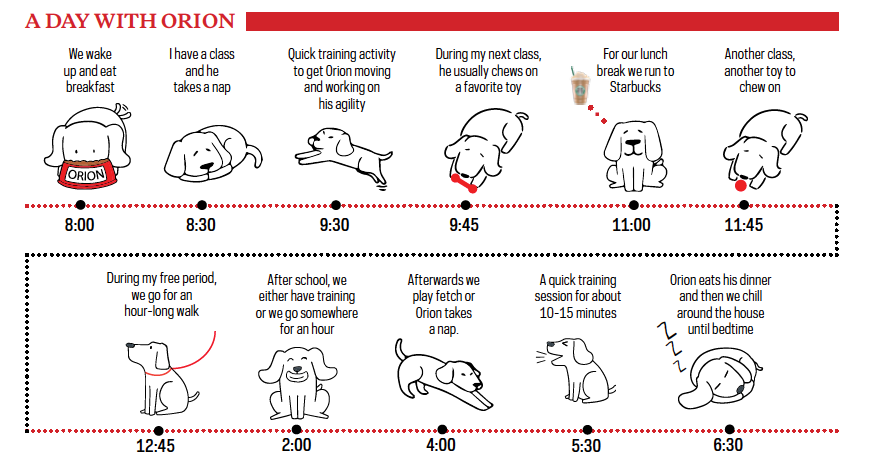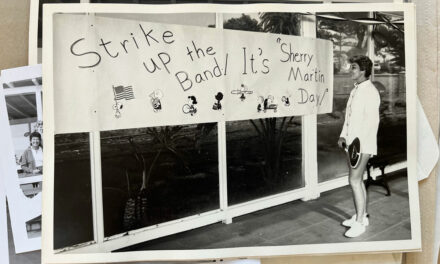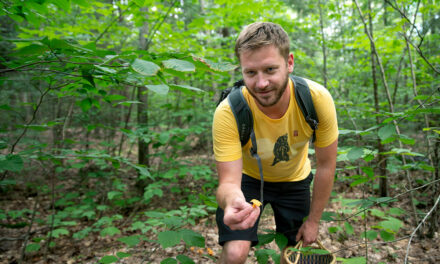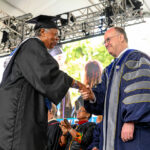
Not Just Any Pup
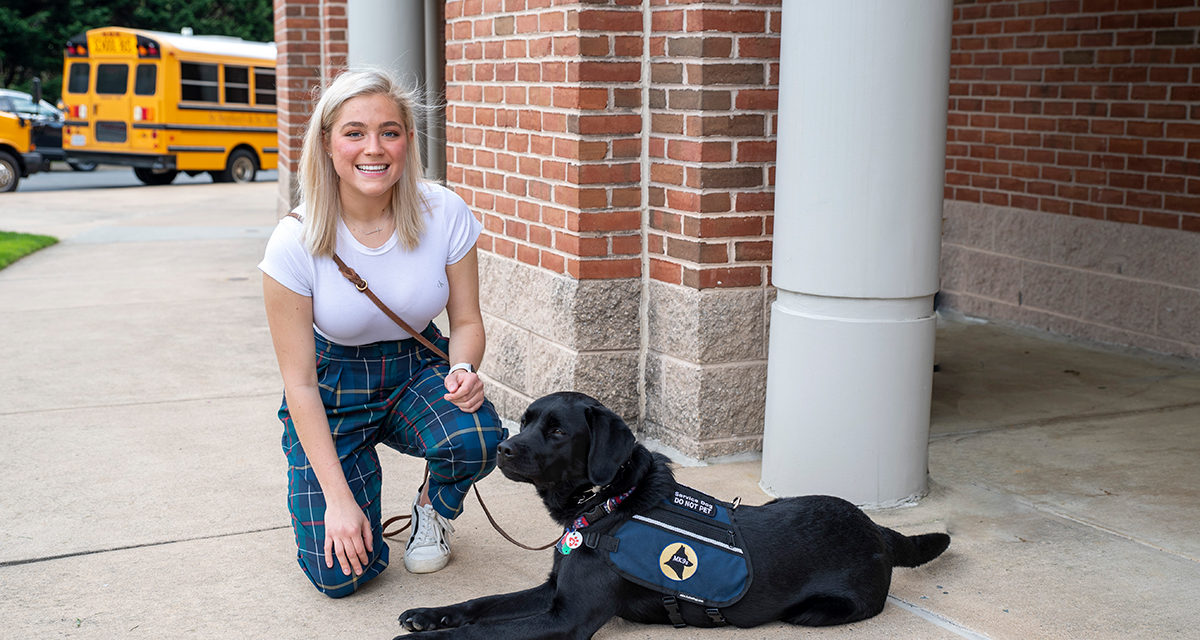
Not Just Any Pup
BY MELISSA MAAS
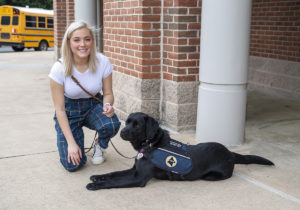 Senior Julianna Swygert is Transforming Orion into a Service Star
Senior Julianna Swygert is Transforming Orion into a Service Star
When Julianna Swygert ’21 was looking for a meaningful way to fulfill the SSSAS service requirement, she jumped at the opportunity to raise a service dog for a veteran. For the past year, she has dedicated herself to working with an adorable, energetic, and loveable Labrador Retriever named Orion. As everything shut down and Julianna settled into distance learning, she and Orion began spending every day together—actually benefiting from the pandemic. Her time with Orion will draw to a close in mid-June, when he leaves to complete the process with another trainer and Julianna heads south to spend the summer in Texas and start college at Texas Christian University in the fall. I spoke with Julianna about her incredible experience training Orion—the process, the challenges, and what it has meant to her.
Q. What inspired you to take on raising and training a service dog?
A. My passion for helping veterans. This time last year I was looking through listings for service work in Fairfax County and I came across an ad for raising a service dog. When I first saw it, I just continued scrolling because there was no way my parents would let me bring a puppy into our house. Believe it or not, my mom found the same ad and said something like “look you can raise a service dog for a veteran through an organization called MK9.” I was shocked that she was okay with it. When I brought it up to my dad, he said yes with almost no convincing. At first, I thought we would welcome a puppy for me to play with and walk daily, little did I know how much work it would take and how rewarding it would be!
Q. What was the process for being accepted as a trainer?
A. The founder and director of MK9, Michele Khol, came to my house, toured the house, and talked to my dad and I for about an hour. I had to read through quite a few training guides and take an open notes test, but it was not too difficult. After the initial interview, house tour, and test, MK9 brought Orion to our house for two small training sessions with me and I was given a key to hand signals for training. During those sessions, we worked on basic skills, such as walking without tugging, sitting, and checking in with me (looking to me for direction). About a month after my first contact with MK9, Orion stayed with us for a test weekend. There was another family in the running to raise him, but luckily Orion and I bonded and he ultimately moved in about a week or two after the test weekend.
Q. Did you need any additional training?
A. Other than what I’ve already described, I was given the puppy with almost no prior training experience. When I first got Orion, he was around 8 months old and already knew the basics. After he moved in, I attended weekly one-on-one training sessions with Orion and Ms. Khol for the following two months. In addition, Orion and I attended—and continue to attend—twice weekly training sessions with the other dogs in the group.
Q. At what point does MK9 pair up the service dogs with their future owners? Do veterans get to spend time with them as puppies?
A. The puppies are paired with their veteran from the start. The veteran gets to see, play, and work with their puppies from the time they are little until the time they receive the dog. When the veteran receives the dog, the dog will still belong to the organization for a set amount of time before the veteran fully owns the dog. The veteran also must attend a set number of trainings after the dog’s graduation. To help with bonding, the puppies sleep with an item from their veteran that contains their scent. Orion sleeps with a pillowcase that his veteran has slept on.
Q. How much time do you have to devote to training Orion?
A. From the time I wake up until the time I go to bed, Orion is with me. We do short training exercises in between classes that last about 12 minutes, 2-3 times daily. After school on Mondays, Orion and I go to a weekly group training (locations change weekly) for about an hour and a half of training. I also attend sessions for the veteran to work with Orion once a week, typically on Thursday for an hour. It is an important opportunity for the veteran to work with Orion out in the world without any assistance from me or Ms. Khol. If it’s not a Monday or Thursday, Orion runs errands with me. If there are no errands to run, we head to one of a variety of locations to further his training in public areas, including the airport, farms, clothing stores, the mall, and dog parks so he can work around loud dogs. These sessions are about an hour depending on where we go. We spend a ton of time at Target and the grocery store. Essentially, whenever I leave the house Orion is by my side, with the exception of work and school on campus. Bringing Orion along with me adds about 15 minutes to my time at places, but it’s so worth it!
Q. What are the biggest challenges you’ve faced with Orion?
A. There are three. First, he used to jump on everyone. He is a people loving dog and whenever we had visitors, he would jump on them and lick them. Thankfully, with the power of the word “stop” and treats, we have been able to mostly stop the habit and he has improved a ton. The second is that since his veteran has been gone for most of his life and he has just recently started seeing him in person, we have had to navigate how Orion will work with him. For example, we had to change one of Orion’s cues to make it easier for the veteran (we used to say “let’s go” for Orion to start walking now we say “walk”). Third, Orion is always on the hunt for socks. While he has gotten better about ignoring socks on the floor, we know that when he leaves the room, he is most likely hunting for a laundry hamper with socks!
Q. What is the timeline for the complete training process? How often is he tested by the MK9 trainers?
A. The original hope was that Orion would graduate and be given to his veteran at around 18 months old. However, with COVID the current dogs in training have not received as much public access training as previous dogs. The training skills that we work on both individually and in group training sessions are to help the dog pass the public access test with their veteran, which is taken annually to ensure that the dog is still on track to work. The test takes about a day, during which the veterans must take their dogs to the airport, library, grocery, restaurant, etc. With no treats as incentive, the dogs have to be given and listen to commands 90% of the time to pass. During the weekly training sessions, the trainers are able to see what the dogs need to work on before they take the full test for the first time. Orion is improving during these training sessions and we continue to figure out what else he needs to work on.
Q. Who is responsible for all the costs associated with Orion? How is this funded?
A. MK9s covers most of the costs. During his training Orion has free veterinary care through Great Falls Animal Hospital, and my family pays for his food at a discounted rate in partnership with Purina. Of course, we buy him toys every now and then, but MK9 gave us everything that we needed, including his crate, bed, toys, leashes, collars, his vest—pretty much everything! These things were purchased using money from donations or are items that have been donated to the organization.
Q. Could Orion be cut from the program? How difficult is it knowing that you are raising Orion for someone else and that you will have to give him up?
A. To date none of the dogs have been cut from the program, and Orion is well on his way to being a great service dog! As for giving him up, I have treated him like my own dog always knowing that he will be going away. When I get sad about the fact that he’s not mine forever, I think about how much he will improve his veteran’s life, and that makes it a little less difficult!
Q. What has this experience meant to you?
A. Overall, this experience has taught me how much work goes into training a service dog. Although I have worked with Orion for countless hours to train him for his veteran, my work is nothing compared to the sacrifices that these veterans make for our freedom. Hands down this has been the best experience of my high school years. I would definitely do this again. I will continue to give back to our veterans in college and hope to raise another service dog after I graduate!
